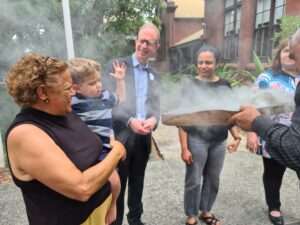Contents
- New Chair for Financial Rights, 2023 Annual Report released
- Industry funding for financial counselling
- Innovate RAP 2023-2025 launched
- A word from Mob Strong Debt Help on dedicated First Nations phone lines in banking
- Scams finally getting the attention they deserve
- E-flyer feedback
- Services during the holiday period
1. New Chair for Financial Rights, 2023 Annual Report released
Peter Kell was appointed Chair of Financial Rights Legal Centre’s Board at our recent Annual General Meeting. Peter joined us earlier this year and brings a wealth of experience from across a broad spectrum, having worked as a regulator, a consumer advocate, and in the private sector. Peter’s full biography was in the October 2023 E-flyer.
We thank our outgoing Chair, Erin Turner, immensely for all of her work on the Board. Erin has been a member of the Board for over eight years and provided invaluable leadership in the position of Chair for the last three years.
Our 2022-2023 Annual Report provides a comprehensive overview of our achievements over the last year including:
- providing a total of 11,919 free legal and financial counselling services
- answering 2,341 Mob Strong Debt Help contacts
- recouping or saving $3,053,376 for our clients.
You can read the full Report in the Annual Reports section of our website.
2. Industry funding for financial counselling
In November, the Federal Government announced it had brokered a voluntary industry funding levy to help pay the shortfall for financial counselling services. The 3 year funding commitment will deliver an extra $30 million to help address unmet community need for financial counselling.
This is a very welcome development. Our financial counsellors are on the phones every day hearing stories about how higher costs of living are impacting people and their ability to make ends meet. Calls to the National Debt Helpline (NDH) are up almost 30% in 2023 – close to pre-Covid levels. Financial Rights is one of two agencies that answers telephone calls to the NDH originating from NSW, and also responds to the NDH Chat line.
The voluntary funding model was designed so that the businesses whose customers benefit from financial counselling contribute proportionately to paying for their services. Disappointingly, some sectors haven’t agreed to pay – in particular the telecommunications industry (apart from Telstra), the Buy Now Pay Later industry (apart from Afterpay), and debt collection industry (apart from Credit Corp).
The Sylvan Review estimated there is a funding gap of around $18 million per year. With just over half of that raised by an industry levy, it is likely there will still be people who miss out on the vital financial counselling supports that could help them get back on track.
This funding is a huge credit to the persistent advocacy of Financial Counselling Australia – well done to FCA and those businesses helping financial counsellors to support people who need it.
3. Innovate RAP 2023-2025 launched
Financial Rights is proud to continue our reconciliation journey by committing to an Innovate Reconciliation Action Plan (RAP). Our 2023-2025 RAP was developed by a working group led by Mark Holden, Senior Solicitor and Policy Advocate at Mob Strong Debt Help.

We held an official launch at the National Centre for Indigenous Excellence in November. Raymond Weatherall from Metropolitan Aboriginal Land Council performed a smoking ceremony, and NSW Aboriginal Woman of the Year Lynda Edwards spoke to attendees, including First Nations special guests from the Indigenous Consumer Assistance Network who flew from Cairns to attend the launch. Financial Rights commits to:
- Ensure our service effectively engages with Aboriginal and Torres Strait Islander peoples in its planning and decision-making processes.
- Develop strong working relationships with Aboriginal and Torres Strait Islander organisations.
- Ensure the services we offer to Aboriginal and Torres Strait Islander peoples are provided in the most effective way, based on a clear understanding of Aboriginal and Torres Strait Islander needs and cultural practices.
- Enhance access to, and outcomes from, our service for Aboriginal and Torres Strait Islander peoples.
- Provide employment and leadership opportunities for Aboriginal and Torres Strait Islander staff.
- Using our networks as a sphere of influence towards reconciliation.
- Show our respect for Aboriginal and Torres Strait Islander peoples – supporting the goals and values of reconciliation.
The full RAP is available on the Reconciliation page of our website.
4. A word from Mob Strong Debt Help on dedicated First Nations phone lines in banking
It is encouraging that the big four banks in Australia are building and developing First Nations dedicated phone lines. These lines can be really useful for First Nations Australians to get culturally supported when sorting out problems and issues, or to access phone banking with First Nations staff or culturally experienced staff.

Wait times are reportedly less, which is promising and useful if you are on the end of a remote phone line. They are very helpful for people who are digitally excluded trying to prove their ID, when the only other options are digital or a day’s drive in a 4WD away at the closest branch. More importantly, speaking with someone that understands First Nations challenges and can help interpret the banks many rules and remove barriers for First Nations people is gold.
Culturally sensitive phone services are a lifeline to a bank for First Nations people in rural and remote areas who do not have access to a branch, or where the cost and distance to travel to a branch are prohibitive or disproportionate to the issue needing to be resolved.
Mob Strong thanks the banks who are prioritising this service to First Nations customers and encourages all banks to create dedicated lines.
5. Scams finally getting the attention they deserve
The end of the year has seen a flurry of scams activity – this time, belatedly, from banks and government.
Banking peak bodies Australian Banking Association and Customer Owned Banking Association have announced what they are calling the Scam-Safe Accord. The cornerstone is the development of a new confirmation of payee system, to be rolled out across all Australian banks. Confirmation of payee will help reduce scams by ensuring people can confirm they are transferring money to the person they intend to.
This is a significant and very welcome development that consumer groups have been advocating for many years. Additionally:
- all banks will adopt further technology and controls to help prevent identity fraud, including major banks using at least one biometric check for new individual customers opening accounts online by the end of 2024
- banks will introduce warnings and payment delays if a customer is transferring money to someone they haven’t paid before or raising payment limits
- all ABA and COBA members will join the Australian Financial Crimes Exchange (AFCX), and the Fraud Reporting Exchange, to better share intel on scammers and help customers recover money faster.
Disappointingly, there was no clear direction requiring banks to reimburse customers who are victim of scams. This would be an important driver in making banks do everything possible to keep their customers’ money safe. We recently helped Ken, when his bank refused to reimburse him for his loss.
Ken is a disability support pensioner. He had, with difficulty, saved $2,000 to visit family in Queensland. Ken was convinced by a scammer to download an app, in order to avoid making an automatic payment. This gave the scammers access to his bank account.
Ken contacted his bank to report the scam when he saw that $2,000 had been taken from his bank account. The bank said it couldn’t do anything until after the transaction was processed. When he followed up, the bank confirmed the transaction had been processed and they couldn’t do anything to recover the money.
Financial Rights wrote to the bank. The bank did its own review and contacted our client to verify what happened. Soon after they offered to reimburse him for his loss, and processed the refund within 2-3 days. Ken was very happy to have his money back and relieved he was able to travel to visit family as planned.
Treasury has also begun a consultation on a Scams Codes Framework, with public comment due by 29 January 2024. Ensuring consumers get adequate redress if they are a scam victim should be front of mind for anyone making a submission.
6. E-flyer feedback
Thanks to everyone who took the time to respond to our survey on the E-Flyer. The feedback indicated 4-5 times a year is the appropriate frequency and we will continue to include a broad range of content including tips for consumers and caseworkers, changes to the law and our advocacy work. Some of the feedback we received was:
“Love your work!”
“I find all your content very valuable and relevant to my work.”
“Thank you for producing this resource newsletter.”
You can provide feedback anytime to media@financialrights.org.au
7. Services during the holiday period
Our services will change during the holiday period.
Closed from 20 December 2023 to 2 January inclusive, reopening 3 January 2024:
- Credit and Debt Legal Advice Line
- Insurance Law Service
- Mob Strong Debt Help
- National Debt Helpline Chat (note: closes from midday on 20 December)
Open from 19 December to 3 January 2024:
- National Debt Helpline – operates weekdays between 9.30am-4.30pm
- Caseworker Hotline (caseworkers only service) – operates weekdays between 9.30am-4.30pm
All services will be back to regular hours from 3 January 2024.

Wishing you all a safe and happy holiday season!
